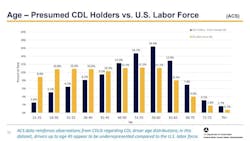Key takeaways:
- The trucking industry faces a labor shortage as baby boomers retire and Gen Z is not filling these roles.
- Lack of awareness about trucking opportunities hinders Gen Z recruitment, making outreach programs and hands-on experiences essential.
- Gen Z values work-life balance, prompting fleets to offer flexible schedules to attract younger drivers.
Labor challenges are nothing new to the trucking industry. Driver and technician shortages get the most attention, but a new workforce shortage is brewing.
The baby boomers, who have dominated trucking for decades, are leaving the industry. But Gen Z isn't replacing them, creating a next-generation shortage. The good news is there are opportunities for fleets to attract the youngest labor pool, according to Melanie Rittenour, director of human resources for Keller Trucking.
“If you look at the studies, we're already in a labor shortage across the country in any industry, but they're already predicting some significant labor shortages in the truck driver market,” Rittenour told FleetOwner. “It's not one that's going to be as easily accommodated by artificial intelligence, so we are going to need the individuals fulfilling these roles. I think that's why it's going to be really important that we make sure we address the needs of the next generation so that we can keep the trucks full and keep freight delivered.”
Gen Z workers
Gen Z roughly includes those born between 1997 and 2012. It is unknown how many Gen Zers are already working in the trucking industry, but the U.S. Department of Transportation’s recent data on trucking demographics is from 2023. See the charts below.
The above graphs specifically cover the age demographics of truck drivers. See the graphs below for the age demographics for other transportation jobs.
Compared to millennials, Gen X, and baby boomers, Gen Z is underrepresented in transportation (of course, some Gen Zers still aren’t 18 years old yet). According to Jane Jazrawy, CEO of CarriersEdge, this generational gap in trucking is nothing new.
“There was a point in trucking around 2010 where it was evident that there were no older millennials,” Jazrawy told FleetOwner. “You had older people and you had some younger people, but there was a big gap in leadership and in the drivers where everybody was 55-plus, and there were no 40-year-olds, until they started getting second-career people … But there was nobody in their 20s and their 30s, like nobody. The age range is finally starting to skew younger.”
Generational obstacles
According to Lindsey Trent, president and co-founder of the Next Generation in Trucking Association, a major obstacle Gen Z faces in entry into the industry is simply a lack of awareness.
“People just don't know about opportunities, and in order to understand the opportunities out there, there has to be industry engagement,” Trent told FleetOwner.
Age also plays a factor. Some fleets may hesitate to hire drivers under the age of 21 because federal regulations prohibit younger CDL drivers from interstate operations. But Trent pointed out that there are entry-level driver jobs that wouldn’t require younger drivers to cross state lines.
“There are plenty of CDL jobs that will hire an 18-year-old without crossing state lines, whether that's a farmer- or a yard spotter-type job,” Trent said. “It’s a matter of getting them connected to those jobs in their area until they’re 21, when they would be able to expand their horizons and cross state lines.”
How to recruit Gen Z
When planning Gen Z recruitment, it’s important to understand what the generation’s values, wants, needs, and hopes are, according to multiple sources that have worked with or recruited Gen Z. Here is their advice:
Recruit early
According to these experts, the importance of recruiting Gen Z at an early stage in life cannot be overstated.
The Next Generation Trucking Association is a trade organization focused on promoting trucking careers. In addition, it encourages carriers to help young people start trucking career paths. Part of Next Gen’s work is building high school CDL truck driver, diesel tech, and supply chain logistics programs across North America.
Similarly, Keller Trucking has a finishing program that includes hiring drivers directly out of CDL school and pairing them with experienced drivers for several weeks to complete their training.
With CarriersEdge’s Best Fleets To Drive For program, Jazrawy witnesses the many strategies fleets are taking to recruit the younger generation.
“Going to high schools and programs like Touch-a-Truck, and when they go out and talk about the blind spots of the truck and things like that, and going to different public events, that's what, about 10 years ago, the best fleets, the people who are on the top 20 in the Hall of Fame now started doing then, and what we're seeing is that's continuing,” said Jazrawy.
Jazrawy said that America’s Service Line, the 2024 Private Fleet of the Year winner, is currently focused on recruiting younger technicians through scholarships. And Garner Trucking is winning over the next generation by taking simulators into high schools for students to try.
Offer work-life balance
Gen Z places a high value on work-life balance, more so than previous generations. Driving jobs don’t always offer this balance, but Keller Trucking has come up with a solution. The fleet offers a four-on, four-off driver position that allows drivers to have more time at home compared to the typical over-the-road driver.
“They partner with a different driver, so it helps us keep our trucks running, but each driver is only out four days at a time versus the longer stints out on the road,” Rittenour said. “We've needed to be a little more creative in coming up with those over-the-road opportunities, which is not something that you used to experience when you were recruiting drivers.”
Have up-to-date technology
Gen Z is often referred to as digital natives. They grew up with computers, cell phones, and the internet. They expect to use technology in their jobs. Next Gen’s Trent said employers wanting to attract Gen Z should invest in and focus on new technology.
A plus is that Gen Z typically needs less technology training than older generations—and might even be helpful when fleets bring on new tech. Rittenour said that Keller allows drivers to decide how much instruction they need on new technology. The fleet also asks workers how they prefer to learn: hands-on or through other resources.
Meet Gen Z where they’re at
Instead of using typical recruitment tactics, tailoring strategies specifically to Gen Z can have a stronger impact.
An example Jazrawy gave was when Gen Xer Tim Chrulski, Garner Trucking's COO, posted a video on social media using Gen X slang. Jazrawy described the video as funny and approachable, especially for the younger generation.
Show that your company cares
According to Trent, Gen Z doesn’t want to work for companies that only care about the bottom line. It is important to them that their employers care about the community, the environment, and other causes.
In recent years, mental health awareness has grown significantly in the U.S. When looking for potential employers, Gen Z typically prioritizes companies that offer mental health support and benefits, Trent said.
How to retain Gen Z talent
A key to good recruitment is high retention rates. After hiring more Gen Zers, it’s important to offer them benefits, opportunities, career growth, and more in order to keep them engaged.
Offer mentorship opportunities
A common Gen Z stereotype is that they aren’t interested in learning from the older generations. But with many from this generation, this simply isn’t true. Many successful fleets that recruited Gen Z offer mentorship opportunities.
“During the new-hire orientation process, we ask them if they want a mentor. I'd say about 50% of them say yes,” Rittenour said.
Once drivers are paired with their mentor, contact information is exchanged so the drivers can communicate on and off the road. Rittenour said the best part of this relationship is the chance for mentors to answer younger drivers’ questions.
“The experienced driver becomes someone the mentee can say, ‘Hey, I'm in this city. Is there a good place to park? Is there a good place to eat? Is there anything I should know about?’”
Listen
Despite being young, Gen Z wants to be heard within their company. Gen Z wants their opinions to matter to coworkers and supervisors, and they do not want to be ignored or discounted because they are newer to the workforce.
“They want to work for somebody where they feel appreciated as a part of the team, and just because they're young, they still want their opinions to matter,” Trent said.
Define opportunities for growth
Gen Z values clarity in their potential career paths and wants to know how they could advance in a company.
“Give them a career path,” Jazrawy said. “Give them some sort of light at the end of the tunnel. A lot of this generation is feeling like there's nowhere to go; if they can see a path forward, that's going to keep them closer. It will keep them at the company longer if they see a career path and if they see where they can use their skills—whatever those happen to be.”
About the Author

Jenna Hume
Digital Editor
Digital Content Specialist Jenna Hume joined FleetOwner in November 2023 and previously worked as a writer in the gaming industry. She has a Bachelor of Fine Arts degree in creative writing from Truman State University and a master of Fine Arts degree in writing from Lindenwood University. She is currently based in Missouri.



